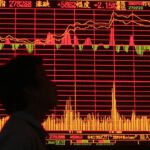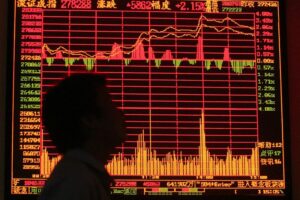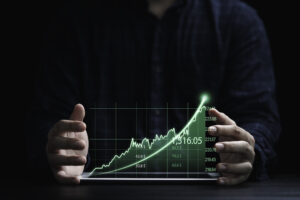
* U.S. Fed unhappy with inflation under 2%
* Virus death toll rises, WHO to reconsider declaring emergency
* Stocks soft, safe-haven assets sought
* Asian stock markets: https://tmsnrt.rs/2zpUAr4
By Tom Westbrook
SINGAPORE, Jan 30 (Reuters) – Asian stocks slipped while gold and bonds were in demand on Thursday as worries about the spread of a new virus from China sent investors heading for safety.
The Federal Reserve kept interest rates unchanged on Wednesday, as expected, although bank Chairman Jerome Powell’s comments about a low inflation outlook added to U.S. government bonds’ appeal.
MSCI’s broadest index of Asia-Pacific shares outside Japan fell 0.8% to an almost seven-week low. Japan’s Nikkei fell 1%. Hong Kong’s Hang Seng extended Wednesday’s drop and Taiwan’s benchmark index opened 1.5% lower in its first session since the Lunar New Year break.
Yields on benchmark 10-year U.S. Treasuries, which fall when prices rise, tumbled nearly 9 basis points overnight to 1.5790%, and drifted lower to 1.5750% in Asian trade, not far above a three-month low of 1.5700% hit on Tuesday.
Gold extended overnight gains to rally 0.2% to $1,579.60 per ounce.
U.S. Fed chairman Jerome Powell said, after keeping rates on hold as expected, that the central bank “is not satisfied with inflation running below 2% and it is not a ceiling.”
With the Fed’s targeted core inflation running at 1.6%, the remark was interpreted as scene-setting for a rate cut, with markets now pricing in a 10% it could come in March.
Powell also snuffed a small rally in equities on Wall Street, saying the new coronavirus, which has been spreading rapidly from its origin in Wuhan, China, added to global uncertainty.
China’s National Health Commission said on Thursday the total number of confirmed deaths from the coronavirus in the country climbed to 170 as of late Wednesday, as the number of infected patients rose to 7,711.
The World Health Organisation’s Emergency Committee is due to reconvene on Thursday to decide whether the rapid spread of the virus now constitutes a global emergency.
“In a matter of days, the coronavirus has shuffled the cards, and Fed policy is not sitting quite as comfortably,” said Alan Ruskin, Chief International Strategist at Deutsche Bank.
“The Fed, like everybody else, is going to have a tough time quantifying the scale of the potentially large shock emanating out of China.”
Overnight, Wall Street turned from positive to flat after the Fed held rates steady. The Dow Jones Industrial Average and Nasdaq Composite inched about 0.05% higher, while the S&P 500 closed 0.1% lower.
U.S. stock futures traded flat amid a slew of mixed company results after hours.
Facebook Inc posted a blowout in costs and slowing revenue growth, while Microsoft Corp and Tesla Inc respectively posted profit growth and production forecasts above expectations.
Seoul-listed Samsung, the world’s biggest memory chip maker and a bellwether of global tech demand, said its December quarter profit fell by a third, as expected, but forecast a turnaround in chip prices this quarter.
SARS 2.0?
Elsewhere, risk currencies and oil paused their recent slide as investors assessed the possible fallout from the virus.
The offshore Chinese yuan, which had strengthened on Wednesday, was again waning – though not by much – to 6.9750 per dollar.
The export-driven Aussie dollar was steady, while the safe havens of the Japanese yen and Swiss franc nudged a little higher.
Oil prices, which have been sliding in anticipation of the virus hurting global demand, sat close to lows touched on Monday. U.S. crude last traded 0.56% lower at $53.03 a barrel. Brent crude settled at $59.81 per barrel.
Most analysts have looked to the impact from the 2002-2003 spread of Severe Acute Respiratory Syndrome (SARS), which pounded tourism and confidence, albeit briefly.
J.P. Morgan economists on Thursday said a big negative shock in the current quarter could knock China’s growth from a previously-forecast 6.3% to 4.9%, for a year-on-year figure of 5.6%. ING economists made a similar forecast on Wednesday.
J.P. Morgan expects a rebound to 7% in the next quarter, assuming current control measures can contain the virus.
“The SARS episode in 2003 suggests that the shock could lead to a large impact on economic activity, especially as the fear factor could restrict people’s mobility,” the bank’s analysts wrote.
“The spillover effect from China to the rest of world tends to be much larger than the SARS episode, both in terms of a demand shock and a supply shock,” they added, pointing out China’s share of the world economy has more than trebled since then. (Reporting by Tom Westbrook; Editing by Sam Holmes)














